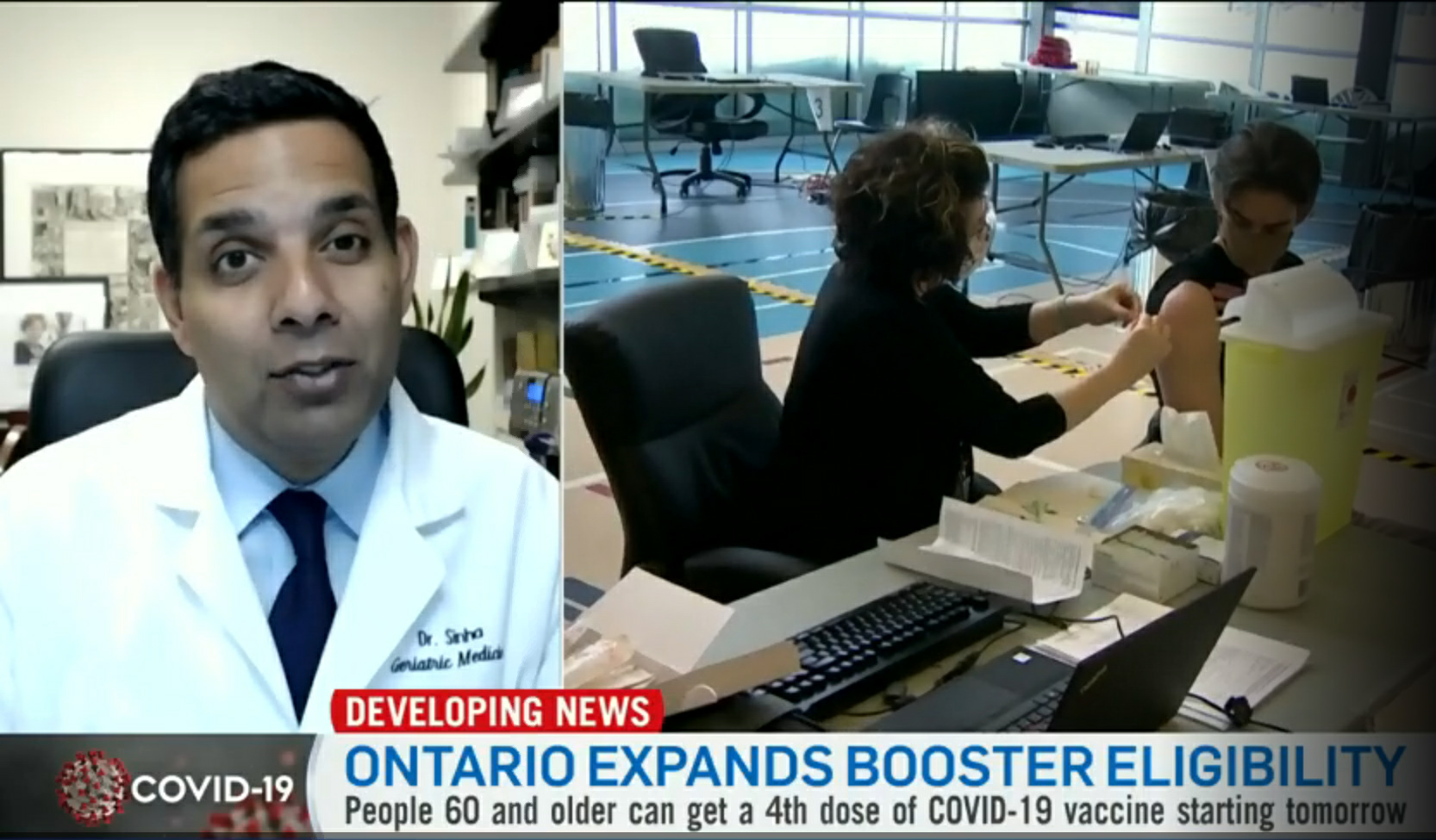"Right now when we look at our older population in Canada, 94% have received at least two doses but only about 80% have actually received their three doses. So we need to do a much better job of getting that third dose to those that haven't gotten it yet before we start thinking about fourth doses. However, for those who have gotten their third dose and it has been over six months, this is where we recommend getting a fourth dose, to provide them with added protection," says Dr. Samir Sinha, NIA Director of Health Policy Research.
Read MoreMore than a million people have turned to an online calculator that was created to help Canadians manage their COVID-19 risk. My COVID-19 Visit Risk Decision Aid, which is free online, was first created during the second wave of COVID-19 in fall 2020.
“People were starting to ask questions such as "Is it safe to visit with others?" and "Are there safer ways to visit with others?" The NIA turned it into a three-minute risk calculator in spring 2021. The tool can be a valuable resource as people navigate what appears to be a sixth wave with few restrictions," says Dr. Samir Sinha, NIA Director of Health Policy Research.
Read More“I think all this mixed messaging is challenging because now when people hear about fourth doses, they think, well, what does it matter? Why would I get a fourth dose when I don’t even need to wear a mask?’” says Dr. Samir Sinha, NIA Director of Health Policy Research.
Read More"The data clearly shows that for older people and those who have immunocompromised systems, the additional doses can be really helpful. Especially given that our natural immunity to the vaccine starts to wane after about three months, more so with these individuals with weakened immune systems. That's why it is recommended for these populations to be given an earlier booster dose than other populations," says Dr. Samir Sinha, NIA Director of Health Policy Research.
Read MoreThe Government of Canada is supporting the NIA My COVID-19 Visit Risk tools (Visit Risk Calculator and Visit Risk Decision Aid) to provide people in Canada with reliable information and tools to help them assess and reduce their individual risk of COVID-19 infection when visiting or gathering with others. This web-based tool is based on the best available scientific evidence, and contributions from a large group of public health and infectious disease experts in Canada.
Read More"Canadians face a dual financial challenge of inflation and retirement that could last 30 or 40 years. In addition, dependable private-sector defined benefit (DB) pension plans are being replaced with defined contribution (DC) or group RRSPs that put the risk on employees," says Bonnie-Jeanne MacDonald, NIA Director of Financial Security Research.
Read MoreThis week, Liberal MP Kirsty Duncan introduced a motion in the House of Commons calling for a national conversation on how Canada can offer better solutions for older Canadians who are facing severe financial challenges as they live longer into their retirements. Motion M-45 would ask the federal government to undertake a study examining population ageing, longevity, interest rates and registered retirement income funds.
"Research by the National Institute on Ageing at Ryerson University has found that 75 per cent of all care is being provided informally by close family members. The same institute also shows the cost of publicly funded long-term care for seniors is expected to more than triple in 30 years, rising from $22 billion to $71 billion," says Duncan.
"These arrangements wouldn’t have the same payment guarantees as annuities, which leaves room for a range of providers, including large employers or groups of employers, insurers, professional associations or even provinces," says Bonnie-Jeanne MacDonald, NIA Director of Financial Security Research.
“We would like to see large pools across plans and across provinces, the more people the better from an actuarial standpoint because then we can provide the most efficient lifetime pension,” says Barbara Sanders, NIA Associate Fellow.
“We need to separate out what actually is age and what is performance, and we need to stop making assumptions that age leads to poorer performance in the workplace. The data does not show that,” says Lisa Taylor, NIA Associate Fellow.
Read More"The COVID-19 Visit Risk Tool asks you to estimate what you think your risk is and then it calculates what we think your risk is. The tool provides you with education, so that you can get the latest up to date evidence and you can make any visit your planning safer," says Dr. Samir Sinha, NIA Director of Health Policy Research.
Read MoreDr. Samir Sinha, NIA Director of Health Policy Research says, "These aren't pie in the sky ideas for home care. We're physically seeing them here in Denmark, and they're all practical & achievable."
Read More"Facing a future of dire gaps in its long-term care model, Canada needs new policies and practices to address the multiple challenges and opportunities," says Bonnie-Jeanne MacDonald, NIA Director of Financial Security Research.
Read More“While governments are ready to say we’re done with COVID-19 and they don’t want to talk about COVID-19 any more because frankly it’s not very great for political fortunes, the reality is you can’t monitor what you don’t measure,” says Dr. Samir Sinha, NIA Director of Health Policy.
Read More"Close to 5000 residents haven't even received a single COVID-19 vaccine dose in in our long-term care homes. We are setting ourselves up for failure, especially if we have a new variant and as community transmission rates grow up while we prematurely relax some of the restrictions that we have in place right now," says Dr. Samir Sinha, NIA Director of Health Policy Research.
Read MoreDr. Samir Sinha, NIA Director of Health Policy Research says, "smaller homes may struggle more with maintaining mandatory vaccine policies because they have fewer legal resources to defend them. The biggest concern is not really for the big chains. Ironically, it’s actually for the not-for-profit, smaller, publicly owned operations that don’t feel have the legal wherewithal to stand on their own and to defend against a claim."
Read More"90% of COVID-19 deaths have happened amongst older people. This has exposed the fact that Canada spends far less than the average OECD country in terms of its long-term care home spending. Underspending and underfunding these homes has led to a high percentage of deaths happening in these settings. We haven't fixed the fundamental issues at play. We really need to end this pandemic with some true action that will fix these fundamental issues," says Dr. Samir Sinha, NIA Director of Health Policy Research.
Read More"Culturally safe and appropriate care really comes to the essence of who we are working with. While we might look the same, we all have different lived experiences, and we might have different cultural backgrounds and needs. Everything from the language we use, the food we serve, and the ways in which we interact with someone are ways that we can express what we call culturally safe and appropriate care," says Dr. Samir Sinha, NIA Director Health Policy Research.
Read More"People feel more financially insecure than ever before. If you take a step back, it is pretty clear why. Retirement financial security means being able to sustain your standard of living throughout retirement. However, if we look at the Canadian retirement income system, retirees are only really getting $20 000 in pension income and the rest should be coming from private savings but right now 80% of Canadians in the private sector are not even in a workplace pension plan," says Bonnie-Jeanne MacDonald, NIA Director of Financial Security Research.
Read More


















